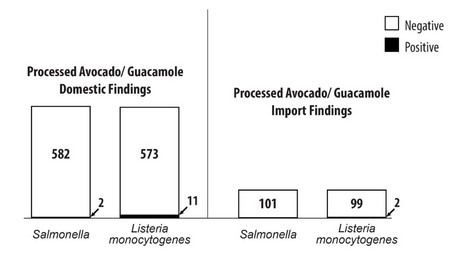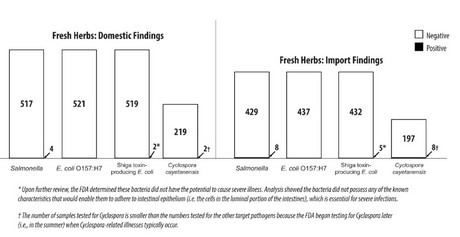Fresh cilantro, parsley and basil are typically eaten without having undergone a ‘kill step,’ such as cooking, to reduce or eliminate bacteria. These herbs are grown low to the ground and therefore are susceptible to contamination (e.g., from irrigation water splashing off the soil). As of July 1, 2019, the FDA has tested 958 fresh herb samples (521 domestic, 437 import), and 685 processed avocado or guacamole samples (584 domestic, 101 import). Testing for all pathogens is still underway and no conclusions can be drawn at this time.

Of the fresh herb samples, 12 tested positive for Salmonella (4 domestic, 8 import), and seven tested positive for Shiga-toxin producing E. coli (STEC). Further study showed that the STEC were incapable of causing severe illness. The FDA did not detect E. coli O157:H7 in any of the fresh herb samples. Of the processed avocado or guacamole samples, 13 tested positive for Listeria monocytogenes (11 domestic, 2 import), and two tested positive for Salmonella (both domestic samples).
From 1996 to 2015, the FDA reported nine outbreaks linked to basil, parsley and cilantro, which resulted in 2,699 illnesses and 84 hospitalizations. Four of the outbreaks were linked to basil, three to cilantro, and two to parsley. Of those same nine outbreaks, seven were attributed to Cyclospora cayetanensis; one was attributed to E. coli O157:H7; and one was attributed to Shigella sonnei. The FDA is seeking to obtain baseline estimates of the prevalence of Salmonella and Shiga toxin-producing E. coli (STEC) in cilantro, basil and parsley.

The FDA also began testing its fresh herb samples for Cyclospora cayetanensis in July 2018, given that Cyclospora-related illnesses typically occur during the summer. The agency detected Cyclospora cayetanensis in two of the 221 samples of domestically grown fresh herbs, and in eight of the 205 samples of imported fresh herbs. The FDA and the Centers for Disease Control and Prevention (CDC) are working together to prevent illnesses caused by Cyclospora.
For more information: 
FDA
Tel: +1 888 463 6332
www.fda.gov
